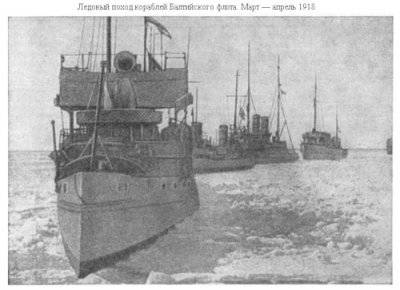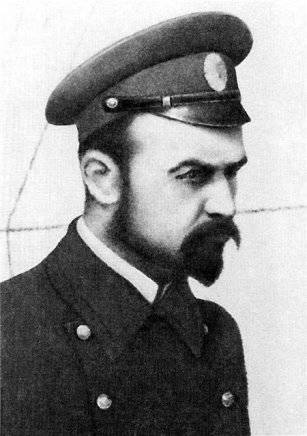Admiral shot for saving the fleet?

judged by the prosecution itself.
Pliny the Younger
The events of the beginning of the past century today are of particular interest to historians. As a result of the declassification and study of a multitude of documents, we will learn all new and, often, amazing, even shocking facts from the life of the country. Soviet story exalted some and branded other individuals who played a role in the development of the state. A huge number of great people were simply deleted from official sources or slandered for ideological reasons. One of these victims of the Bolsheviks was the savior of the Baltic fleet A.M. Happily. What did this man deserve the fierce hatred of Leo Davydovich Trotsky, and why is he called the savior of the Navy in the Baltic?
In 1918, under the terms of the Brest Peace Treaty, the Soviet authorities were obliged to withdraw the combat flotilla from the Baltic expanses. However, it turned out to be very difficult, because the waters shackled the ice. This circumstance was beneficial to the Germans, who were on the outskirts of the Finnish ports and hoped to get Russian warships without a fight. From the documents investigated by F. Zinko, it is known that in order to avoid the transfer of such a powerful potential into the hands of the Reich, the United Kingdom offered to pay a large sum for each warship destroyed. The British, thus, got rid of the dangerous presence of the Soviet fleet in the Baltic, and also did not allow Germany to increase its military potential due to the abandoned ships. If we consider these facts in aggregate, it becomes clear why Trotsky sent an order to Shchastny ordering that the entire fleet be blown up with the promise of a reward to each of the seamen. However, Alexei Mikhailovich was one of those people who faithfully served not so much the state and the bosses as their homeland. Instead of fulfilling the order, Shchastny sent him to the Council of Fleet Commissioners, indicating that he considered it unacceptable and immoral to destroy ships and pay remuneration for this. This was the first step towards enmity with Lev Davydovich. A particularly important role in the appearance of confrontation was played by the fact that the Council supported Alexei Mikhailovich and declared that the ships would be blown up only in battle, and also if there was no other way.
In the opinion of some of the researchers, the Bolsheviks were closely associated with both Germany and Great Britain, as evidenced by the documents on the promotion of the sealed wagon and the correspondence that Lenin, Trotsky and others hid and tried to pass off as fake.
The merit of Shchastny, who is the chief of the Morsil on the Baltic, is that in February 1918 he brought all the ships from Reval and led them to redeploy to Kronstadt. This decision was made against the wishes of Trotsky, but was later supported by Lenin, largely due to the success of the enterprise and the desire to conceal the intentions to destroy the country's flotilla. After the arrival of the last ship, it became known about a certain verbal order of Vladimir Ilyich about the relocation. In fact, the Bolsheviks always feared the representatives of the naval army, especially after the events in Kronstadt, when the officers were simply torn to pieces. Managing a community like sailors was very difficult, and the manipulations had to be skillful and subtle.
What was the indignation of the German command, when it was discovered the absence of ships in the port. An interesting fact, once again confirming the Bolsheviks' intention to destroy the fleet and transfer its separate parts of Germany, is the facts indicating the existence of some kind of agreement. After the Germans did not find the promised ships in Revel, they sent a secret protest note to Moscow. The question is, what exactly Shchastny violated when he took the ships to Kronstadt? Under the terms of the Brest Agreement, there was a provision stating that Russia could not have a fleet in the Baltic, but it was not a question of the complete destruction of cruisers and battleships and the elimination of the country's Navy.
 The personality of Shchastny became popular among sailors, which made the Bolsheviks rather alarming. First, Aleksei Mikhailovich was a hereditary nobleman, that is, the class enemy of the proletariat. Secondly, his career began even before the revolution, and he was considered an honored military commander in the navy, had imperial and foreign awards. Thirdly, it was a highly educated person with an unbending will, organizational talent, and independent views. Such an influential admiral automatically became a threat only to a strengthened revolutionary power. In addition, his bold arguments about power and the organization of the management of the naval forces made him a rival in the eyes of the Bolsheviks, and they did not intend to leave the competitors alive.
The personality of Shchastny became popular among sailors, which made the Bolsheviks rather alarming. First, Aleksei Mikhailovich was a hereditary nobleman, that is, the class enemy of the proletariat. Secondly, his career began even before the revolution, and he was considered an honored military commander in the navy, had imperial and foreign awards. Thirdly, it was a highly educated person with an unbending will, organizational talent, and independent views. Such an influential admiral automatically became a threat only to a strengthened revolutionary power. In addition, his bold arguments about power and the organization of the management of the naval forces made him a rival in the eyes of the Bolsheviks, and they did not intend to leave the competitors alive.Once, in a conversation with Zinoviev, Alexey Mikhailovich informed him that he had been elected dictator in Petropavlovsk, but he refused. Many researchers believe that from this point on the Bolsheviks took all possible measures to get rid of the hated admiral as soon as possible. Shchastny’s arrest took place in Trotsky’s office after Lev Davydovich’s attacks on him received calm but very bold and straightforward answers. Alexey Mikhailovich denied his involvement in the counter-revolutionary conspiracy, and since the appearance of justice was to be preserved, Sverdlov developed a provision on the Revolutionary Tribunal. Shchastny became the first defendant in this illusory judicial body.
Fortunately, fragmentary information about the court session has been preserved, and we can restore the course of events and be convinced of the accusatory nature of the process ourselves. There could be no question of a fair trial, Shchastny was sentenced long before the meeting and was only pronounced in court. Certain individuals were formally called as witnesses, but none of them appeared, so the only arguments were Trotsky's testimony. Lev Davydovich took advantage of this chance and sent all his oratorical talents to destroy the admiral. The verdict sounded ridiculous, as it followed from it that Shchestny, with the heroic salvation of the Baltic Fleet, was determined to gain favor for the unfolding of counter-revolutionary activities. However, there are numerous moments in the minutes of the meeting and the testimony of Trotsky, which make one wonder that the prosecution had another reason to immediately eliminate Alexei Mikhailovich.
During the arrest, the red admiral’s briefcase was seized in the first place. What remained in this mysterious portfolio can only be judged by fragments of phrases and the further behavior of the Bolsheviks and, most importantly, Trotsky himself. From the testimony of Lev Davydovich it follows that Shchastny is guilty, among other things, in the dissemination and maintenance of rumors about the connection of the Bolsheviks with Germany, as well as the falsification of certain documents confirming this connection. From the sentence can be distinguished phrase, which clearly indicates the presence of such documents, because they are called not only false, but also classified. The simultaneous recognition of the papers that were in Alexey Mikhailovich’s portfolio, both false and secret, pushes certain thoughts, since it does not make sense to close access to a fake. By the way, after the refusal to pardon the admiral from the Revolutionary Tribunal, the Social Revolutionaries went out demonstratively, sincerely believing that with such a protest they would be able to preserve the predominance of legality over revolutionary expediency. However, history has shown that this was a serious mistake that provoked a series of unjust decisions against "the enemies of the proletariat and communism."
Even the fact of the execution of Shchastny at night at the Alexander School and the complete disappearance of the corpse suggests that the authorities had something to fear. According to Andriyevsky, who led the execution, the body of the admiral was buried under the floor in the same school, and the order for urgent burial came from the leadership, and the officials came to make sure that the assignment was done. One involuntarily asks the question, isn’t there a lot of attention for the ordinary provocateur and traitor? In addition, the death penalty at the time of execution was not used in the Soviet state, and the case with Shchastny was the first in judicial practice. More dangerous criminals were spared, but for some reason they did not do this in relation to Alexei Mikhailovich. The admiral was shot for treason or ...?
In the history that is taught to us in educational institutions, the mention of this person is almost impossible to meet. Basic information about it became available quite recently, however, even today the topic is quite painful and acute. Talking about the Bolsheviks, one should not go to extremes and repeat their mistake. Soviet historians have sufficiently discredited themselves with a one-sided view of tsarism, as well as the political background of their work, therefore, returning to the events of that period, the problem should be studied from various sides and try to be as objective as possible. The official interpretation of the reasons for the shooting of the admiral is betrayal and counter-revolutionary activities, but there is another point of view that deserves our attention.
Information